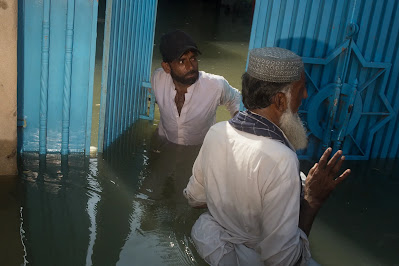by Hiba Heba
for the flood victims of Pakistan
 |
| A heavily flooded home in Rajo Nizamani village, near Jhirk, Sept. 10. Credit: Hassaan Gondal for TIME. |
You can help the UN World Food Programme—the world’s largest humanitarian agency—provide life-saving food to the most vulnerable families. CLICK HERE TO DONATE NOW.
Koyal chirps / in the dark street /
Leaves / barks / magnolias / roofied by the dark street /
The moon is blighting / the sky / in this poem / this poem is a dark street /
We played cricket / in the same desolate / streets /
I bled / between my legs / bled the size of a vat / in this dark street /
Tonight I dangle / my legs over the railing / thinking / mourning /
O Dark Street / how loud is your thunder / of desolateness /
even the clouds / denounced it / they rained / raged / bled /
In Urdu when it rains / we say / badal baras rahe hain:
the clouds are falling / falling / tearing through /
the fearful blue / of the dark street /
Every night I call Daisy / home / from my kitchen’s old window /
every night / she prances over the railing / then in my arms /
I trust these long / misleading / dark streets /
the streets hold / together / our tenderness /
When a mother wades / through the cloudy / deluge /
ululating the names / of her children / Musa / Musa / Musa /
she knows all / that has drowned / will eventually
be found / when the clouds ascend / even the tenderness /
now holding itself / against / the koyal-gloom / of the dark street /
Hiba Heba is a Pakistani poet who recently launched an online business, RepairInk, that provides editing and proofreading services. She was the first runner-up for the New Feathers Award 2021. Her poems have appeared or are forthcoming in Eunoia Review, Fragmented Voices, The Ofi Press and Poetry Wales, among others. Hiba has a micro-chapbook, Grief is a Firefly (Origami Poems Project, 2021), and her debut full-length poetry collection Birth of a Mural will be published by the US-based Golden Dragonfly Press in October, 2022.







